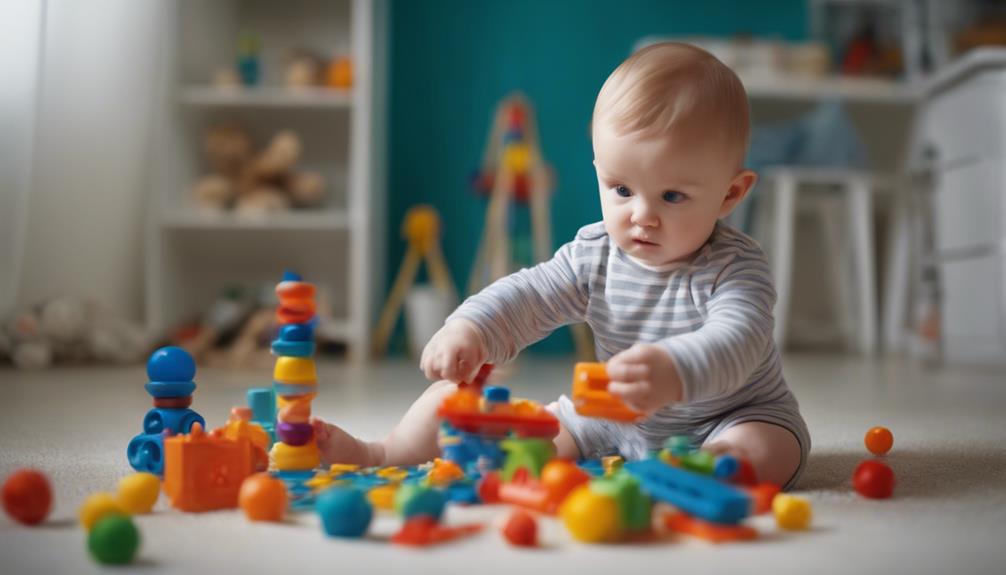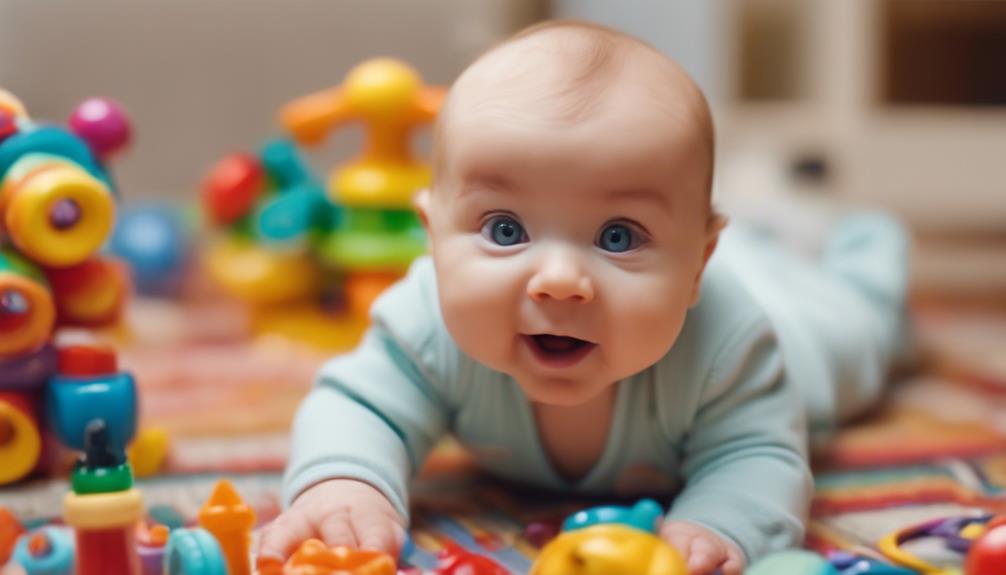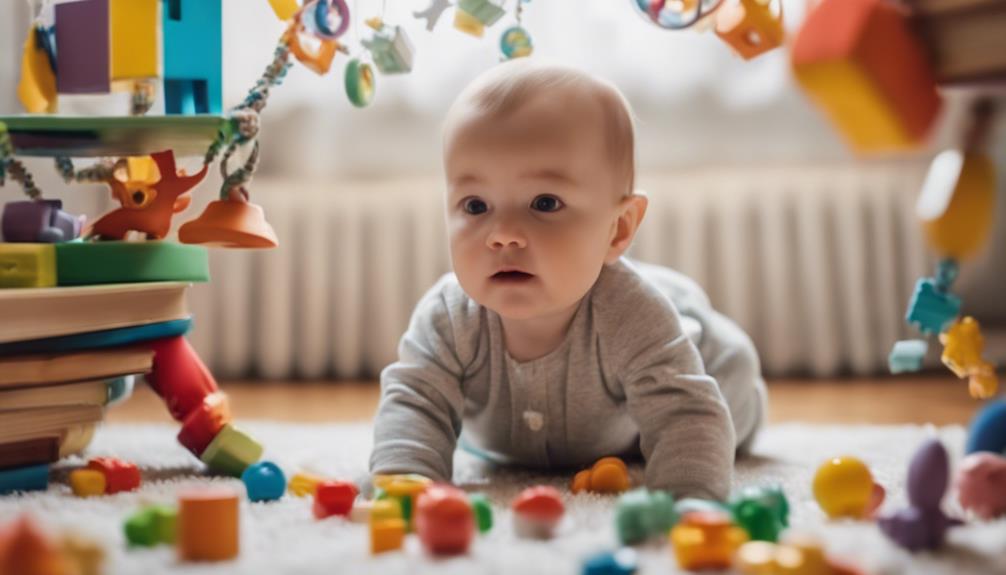Early speaking infants show signs of advanced language development and cognitive abilities, indicating high levels of intelligence. Infants who start vocalizing early and respond to verbal cues typically exhibit strong cognitive skills. Reaching speech milestones ahead of schedule and demonstrating linguistic talent are important markers of intelligence. To promote early speaking intelligence, engage in regular conversations, promote clear pronunciation, and create language-rich surroundings. Encourage cognitive development through hands-on exploration and interactive play to enhance problem-solving abilities. By identifying these signs and incorporating suggestions, you can effectively nurture your baby’s language skills and cognitive development.
Key Takeaways
- Early signs of talking intelligence include babbling interest, sound imitation, gesture use, simple instruction understanding, and curiosity for new words.
- Engage in frequent conversations to support early talking intelligence.
- Read aloud regularly to enhance vocabulary and language skills.
- Create a language-rich environment at home for language growth.
- Encourage vocalization, response, and clear pronunciation to boost early talking intelligence.
Early Communication Skills
Developing early communication skills in babies is vital for fostering their intelligence and cognitive abilities. Babies who engage in vocalizations, follow verbal cues, and start forming sentences at an early age often display signs of advanced language development linked to intelligence. These early talkers not only demonstrate strong emotional connections but also showcase advanced cognitive abilities and problem-solving skills from a young age.
Observing developmental milestones such as sitting up early, quickly grasping objects, and gesturing ahead of their peers can provide insights into the intelligence of babies. Additionally, intelligent babies may exhibit personality traits like persistence, determination, assertiveness, and early negotiation skills, further highlighting the importance of early communication skills in cognitive development.
Exposure to multilingual environments, engaging in interactive games that stimulate brain development, and receiving regular positive reinforcement can play vital roles in enhancing the intelligence of babies who exhibit early communication skills.
Language Development Milestones

As your baby begins their language development journey, it's essential to track their progress through key milestones. These milestones include recognizing tonal changes and expressing emotions through vocalizations by around 6 months old.
At 12 months, your little one may start using 1-2 words and understanding simple phrases, marking an exciting phase in their linguistic growth.
Key Milestones in Language Development
In a child's early years, important milestones in language development mark significant progress in communication skills. Toddlers typically start babbling and making sounds for communication at around 3 months, signaling the onset of their language development journey.
By the age of 12 months, babies usually have a vocabulary of 1-2 words and begin to comprehend simple phrases, marking early language milestones.
At 2 years old, toddlers often incorporate gestures in conversations, possess a vocabulary of approximately 50 words, and start constructing two-word phrases, indicating further advancement in language development.
By the time children reach 3 years old, they generally grasp plurals, pronouns, and time concepts, boast a vocabulary of around 200 words, highlighting continued growth in language skills.
As children turn 4 years old, they can usually recount stories, respond to inquiries, and recognize colors, shapes, and sizes, displaying considerable progress in their language development journey.
Tracking Baby's Progress
Tracking your baby's progress in language development involves observing key milestones that indicate their growth in communication skills. By around 3 months, babies begin making sounds for communication, progressing to longer babbling sentences by 9 months. At 18 months, your baby may have a vocabulary of 10-20 words and recognize common items. Around 2 years old, toddlers start using gestures in conversations, possess a vocabulary of about 50 words, and begin using two-word phrases. By 3 years old, children understand plurals, pronouns, and time concepts, boasting a vocabulary of roughly 200 words. Monitoring these language skills milestones is crucial for identifying any potential issues early on and providing the necessary support for your baby's growth in communication skills.
| Age | Language Skills Milestones |
|---|---|
| 3 months | Starts making sounds for communication |
| 9 months | Progresses to babbling longer sentences |
| 18 months | Vocabulary of 10-20 words, recognizes common items |
| 2 years | Uses gestures in conversations, 50-word vocabulary, starts using two-word phrases |
| 3 years | Understands plurals, pronouns, time concepts, vocabulary of roughly 200 words |
Signs of High Intelligence
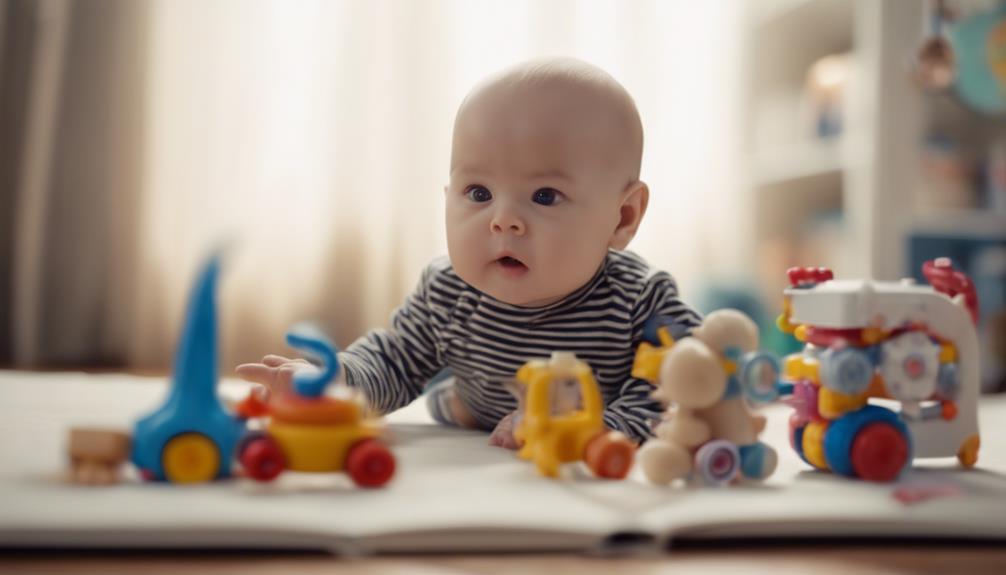
High intelligence in babies can be recognized through various signs such as early speech milestones and cognitive development indicators.
Achieving speech milestones like forming sentences early and effective communication, coupled with cognitive abilities such as extreme focus and creative problem-solving skills, are key indicators of high intelligence in infants.
Speech Milestone Achievements
Moreover, by reaching speech milestone achievements early, you can exhibit signs of high intelligence in your baby. Early talkers often show signs of being smart by vocalizing sooner than their peers, following verbal directions with ease, and constructing sentences ahead of schedule. These achievements not only indicate linguistic prowess but also reflect cognitive abilities and emotional intelligence. Intelligent babies demonstrate a deep connection with others, exhibiting empathy and mature thinking from an early age.
Moreover, their developmental milestones, such as sitting up promptly, grasping objects quickly, and displaying early gestures like waving, highlight their advanced cognitive and physical capabilities. Personality traits of intelligent babies often involve assertiveness in communicating needs, negotiating for desires, and displaying strong determination to achieve goals.
Their cognitive skills are marked by intense focus, curiosity, creative problem-solving abilities, and a relentless drive to find solutions. Watching for these speech milestone achievements can provide valuable insights into your baby's intelligence and overall development.
Cognitive Development Indicators
Early talkers exhibiting signs of high intelligence often display cognitive development indicators such as extreme focus, sharp memory, and vivid imagination from a young age. These cognitive skills are essential in identifying babies with advanced intellectual abilities.
Here are some key indicators of high intelligence in early childhood:
- Extreme focus and high curiosity contribute to problem-solving skills.
- Sharp memory and vivid imagination enhance cognitive abilities.
- Taller babies with high birth weights may excel academically, showing a physical aspect of intelligence.
- Exposure to multiple languages and stimulating environments positively impacts cognitive development.
Cognitive Development Tips
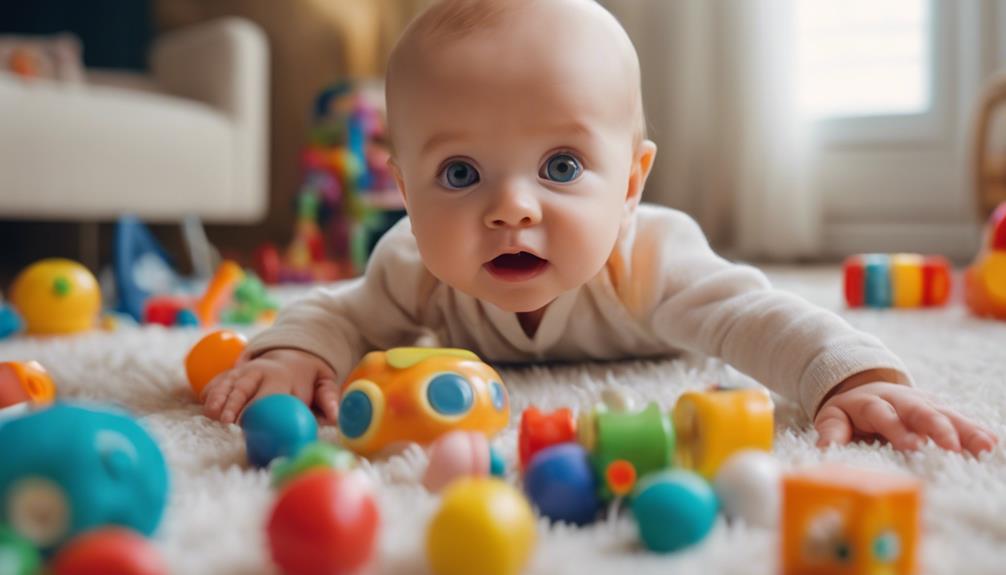
How can you enhance cognitive development in early talking babies through engaging activities?
Engaging in hands-on games like puzzles and building blocks can greatly contribute to brain development and language development in babies. These activities not only stimulate cognitive skills but also promote problem-solving abilities.
Encouraging problem-solving skills through activities that require critical thinking and logical reasoning can further enhance cognitive development. Providing opportunities for exploration and discovery can foster curiosity and a thirst for knowledge in intelligent babies, thereby supporting their cognitive growth.
Reading books with interactive elements and colorful illustrations is another effective way to boost cognitive development and language skills in early talking babies. The visual stimulation and engagement with the storylines can aid in their overall cognitive development.
Additionally, offering positive reinforcement and praise when babies demonstrate cognitive skills and problem-solving abilities can further motivate them to continue engaging in activities that promote cognitive growth.
Boosting Baby's Vocabulary
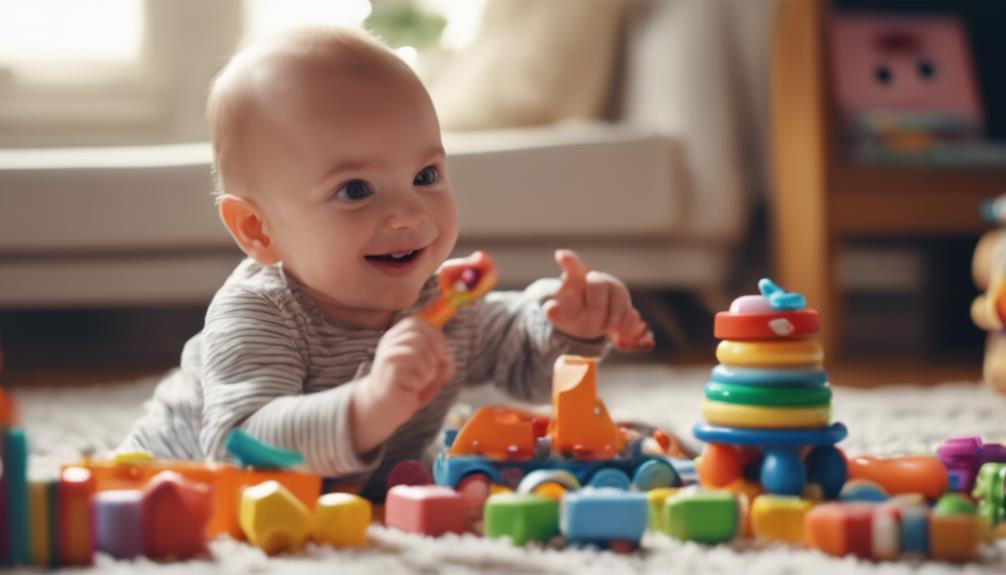
To enhance your baby's vocabulary, engaging in vocabulary-building activities, reading aloud daily, and encouraging word repetition are key strategies.
By incorporating these practices into your daily routine, you can help your little one expand their language skills and communication abilities.
These simple yet effective methods can positively impact your baby's cognitive development and set a strong foundation for their future learning.
Vocabulary-Building Activities
Engage in vocabulary-building activities early on to boost your baby's language skills. Introducing varied language experiences in your baby's daily routine can greatly contribute to their vocabulary development.
Here are some effective ways to enhance your baby's vocabulary:
- Read Regularly: Reading to your baby exposes them to new words and helps expand their language abilities.
- Converse Often: Engaging in conversations with your baby from an early age can enrich their vocabulary and communication skills.
- Play with Words: Introduce new words and concepts through play and daily interactions to help build your baby's vocabulary effectively.
- Label Objects: Pointing out and labeling objects in your baby's environment can aid in their vocabulary development by associating words with real-world items.
Reading Aloud Daily
Introducing reading aloud daily to your baby can greatly enhance their vocabulary and language skills. Research indicates that babies who engage in regular reading sessions tend to have larger vocabularies and better language development.
When you read to your baby, you expose them to a variety of words, helping them learn new vocabulary and understand language patterns. This practice not only aids in their language development but also fosters strong communication skills from an early age.
Additionally, the bond formed during these reading sessions can create a positive association with books and learning, setting a solid foundation for their cognitive growth.
Encouraging Word Repetition
Encouraging word repetition with your baby can greatly boost their vocabulary by reinforcing new words and concepts. Repetition aids in memory retention, allowing babies to recall and use words more effectively.
Engaging in word repetition activities like naming objects and describing actions can enhance language development. Babies learn through repetition, gradually expanding their vocabulary and understanding of language.
Consistent word repetition in daily interactions supports baby's language learning and communication skills.
- Repeating Words: By repeating words frequently, you help your baby grasp their meanings and use them in their own communication.
- Enhanced Vocabulary: Through consistent word repetition, your baby can build a strong vocabulary foundation for future language skills.
- Improved Memory: Repetition helps babies remember words better, facilitating their ability to recall and apply them in various contexts.
- Language Development: Encouraging word repetition in daily interactions fosters language growth and comprehension in babies.
Encouraging Reading Habits
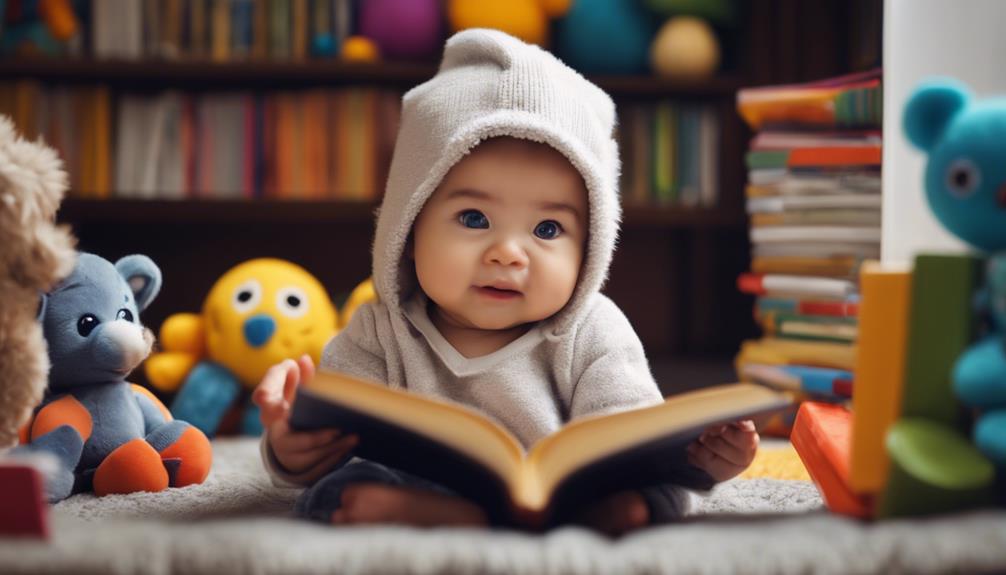
To foster a lifelong love for reading in your baby, regularly expose them to a variety of books from an early age. Reading to your baby not only enhances their vocabulary and language skills but also contributes to making them smart individuals. Babies who are exposed to books early on tend to show a heightened interest in reading as they grow.
By reading aloud to your baby, you aren't only promoting bonding but also strengthening your parent-child relationship. Introducing a diverse selection of books can stimulate your baby's curiosity and imagination, setting a strong foundation for their cognitive development.
Bedtime stories play an important role in helping babies relax, improving their attention span, and nurturing a deep love for reading. Embracing reading habits early on can have long-lasting positive effects on your baby's intellectual growth and overall well-being.
Enhancing Problem-Solving Skills
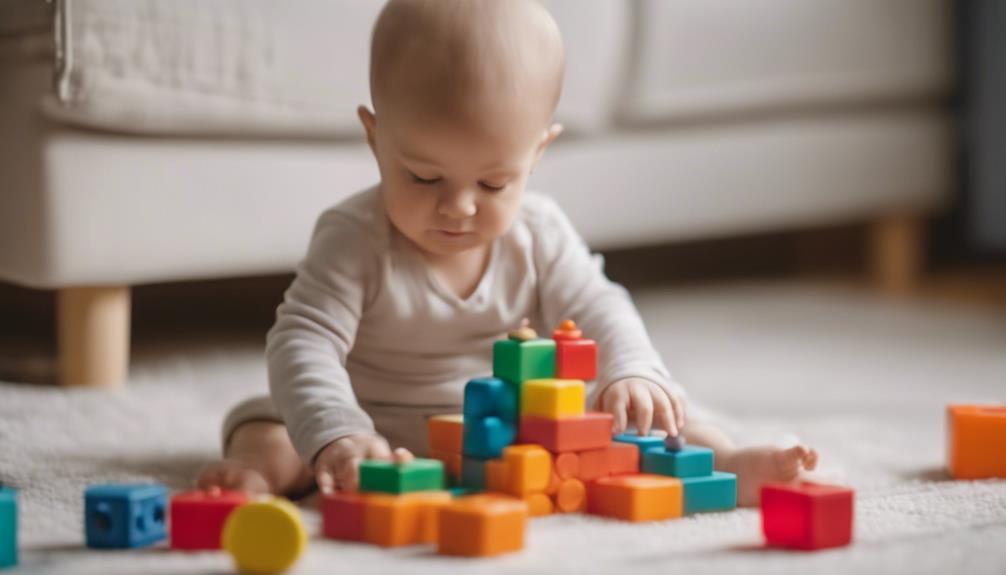
To cultivate advanced problem-solving skills in your baby, consider ways to engage their natural curiosity and encourage hands-on exploration and discovery.
Here are some strategies to enhance your early talking baby's problem-solving abilities:
- Provide interactive toys: Offer toys that require problem-solving, like shape sorters or puzzles, to stimulate your baby's cognitive development.
- Encourage experimentation: Allow your baby to explore different solutions to challenges independently, fostering a sense of autonomy and critical thinking.
- Engage in interactive play: Participate in games that involve problem-solving, such as building blocks or simple treasure hunts, to promote cognitive growth.
- Create a stimulating environment: Establish a safe and enriching space where your baby can freely investigate and learn, encouraging a proactive approach to problem-solving tasks.
Importance of Positive Reinforcement

Positive reinforcement plays an essential role in nurturing the language development of early talking babies. When caregivers provide positive feedback and encouragement, they boost the confidence and motivation of babies to communicate effectively. Praising and acknowledging a baby's efforts in language development can be a powerful tool in encouraging them to continue learning and exploring new words.
By celebrating small milestones and progress in language skills, a significant learning environment is created for these young learners. Using techniques like smiles, claps, and hugs can reinforce a baby's early attempts at communication and language acquisition. This positive reinforcement not only helps babies feel supported and valued in their language development journey but also fosters a sense of accomplishment and enthusiasm to engage in verbal interactions.
Caregivers play an important role in shaping the language skills of early talking babies through their use of positive reinforcement techniques.
Stimulating Environment for Baby
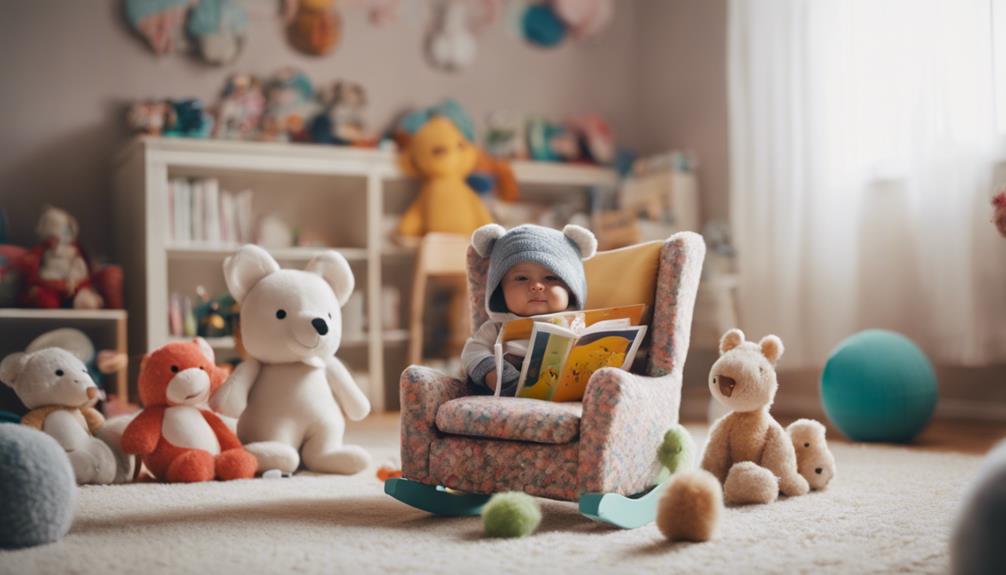
Creating a nurturing and stimulating environment for your baby involves providing exposure to diverse language experiences and engaging interactions. Around this age, it's essential to set up an environment that encourages your baby's curiosity, exploration, and overall development.
Here are some tips to create a stimulating environment for your little one:
- Encourage Observation and Interaction: Babies benefit greatly from being in environments where they can observe, imitate, and interact with caregivers.
- Rich Language Environment: Providing a rich language environment aids in vocabulary development and cognitive skills.
- Interactive Activities: Engaging in activities like reading, singing, and talking to your baby can enhance their language and cognitive development.
- Variety in Experiences: Introducing a variety of experiences can stimulate your baby's senses and contribute to their learning and growth.
Nurturing Cognitive Abilities

Fostering cognitive abilities in early talking babies involves nurturing their problem-solving skills and creative thinking through engaging activities and positive reinforcement.
Intelligent babies often exhibit advanced cognitive abilities, including persistent problem-solving and imaginative thinking. If you notice your baby showing signs of intelligence, such as extreme focus, curiosity, high energy levels, and alertness, it's crucial to provide them with opportunities that stimulate their cognitive development.
Encouraging activities like reading together, allowing for exploration in a safe environment, and providing positive reinforcement for their efforts can help nurture their cognitive abilities further. These activities not only support their current cognitive skills but also lay a solid foundation for future intellectual growth.
Frequently Asked Questions
Do Intelligent Babies Talk Earlier?
Yes, intelligent babies often talk earlier than their peers. It can be a sign of high intelligence and cognitive development. Early talkers may show advanced problem-solving skills and strong memory retention. Parents can nurture this by engaging in conversations and reading.
Does Early Talking Mean Higher Intelligence?
Yes, early talking can indicate higher intelligence in babies. While not foolproof, research suggests a link between early language skills and cognitive development. Celebrate your little one's milestones; their chatter may hint at a bright future ahead.
How Early Can You Tell if a Baby Is Smart?
You can tell if a baby is smart early on by observing strong eye contact, responsiveness to sounds, early vocalizations, and high energy levels. Encouraging activities like communication, games, and positive reinforcement can enhance their intelligence development.
How Do You Know if Your Baby Is Talking Early?
When your baby starts talking early, you'll notice their quick grasp of words and sentences. Their communication skills will impress you, and their ability to express thoughts clearly will show their intelligence shining through.
Conclusion
As you continue to nurture your baby's cognitive abilities and language skills, remember that every word they speak is like a tiny seed planted in the garden of their mind. Water it with love, encouragement, and positive reinforcement, and watch as their intelligence blossoms and grows.
Your efforts now will shape their future success and development, so keep talking, listening, and engaging with your little one every day. The power of early communication can't be underestimated.


